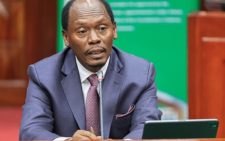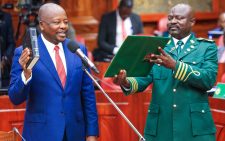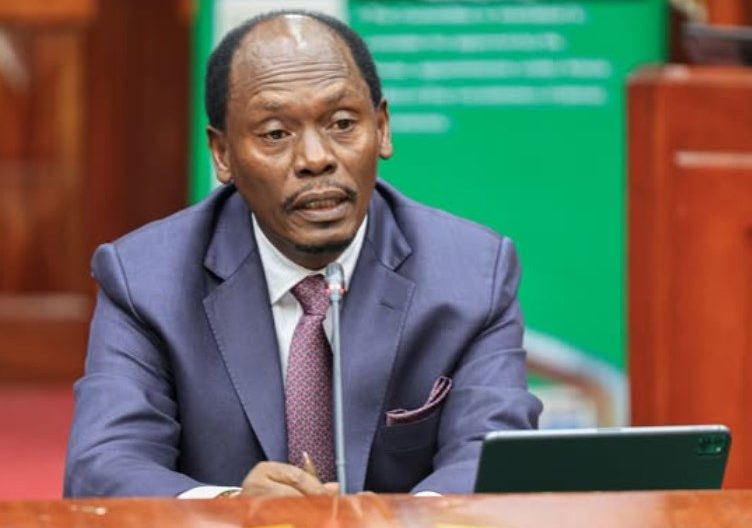Supreme Court rejects activists suit to block Ruto swearing-in

The Supreme Court yesterday struck out a petition seeking to stop the swearing in of President-Elect William Ruto and his deputy Rigathi Gachagua over integrity issues.
A seven-judge Bench, led by Chief Justice Martha Koome, threw out the case by 11 activists following an objection by Ruto, Gachagua and United Democratic Alliance (UDA) together with the electoral commission and its chairperson Wafula Chebukati.
Activists, led by Kenneth Njiru, Meshach Churchill, Jackson Mwalulu and Beatrice Kamau had sought to block the duo’s swearing in set for next Tuesday.
The activists wanted the court to declare the nomination of Gachagua invalid, arguing that President-Elect Ruto violated the Constitution by declaring the former his deputy in the August 9 polls.
But the court ruled that it does not have powers to deal with the issues raised by the activists, saying the petitioners should have filed the case at the High Court.
“Applicants are inviting the Court to assume jurisdiction outside the confines of Article 163 (3) as read with Article 140 (1) of the Constitution. They are inviting the court to unconstitutionally expand its jurisdiction. To wait until a day to the General Election, before seeking the orders of such magnitude casts the petitioners in a cynical scheme of abuse of the processes of this court,” the judges said.
Ruto, Gachagua and their sponsoring political party, UDA, in a separate joint response had challenged the jurisdiction of the court to hear and determine the case, arguing that the Supreme Court cannot handle such a case at first instance.
They stated that the Apex court does not only lack the powers to hear the case but also that the suit is “incompetent and incurably defective both in form and in substance, and is therefore untenable”.
“Petition offends the principle of exhaustion as regards avenues of recourse available pursuant to Article 88 (4) (d) and (e) of the Constitution. It fails the test of justiciability and ripeness and offends the principle of sub-judice as there is another constitutional petition pending before the High Court,” UDA’s Secretary General Veronica Maina told the court.
IEBC together with its chairman, Wafula Chebukati, in a joint response to the suit, also said the Apex Court does not have the powers to deal with the issues raised by the activists regarding eligibility of Ruto-Gachagua ticket due to integrity issues on the latter. They argued that the petitioners prematurely and wrongly invoked authority of the Supreme Court to hear and determine constitutional matters.
“Petition is an abuse of the court process and it amounts to forum shopping in that the petitioners have filed a similar petition at the High Court constitutional division where they are seeking similar orders and based on the same set of facts,” IEBC noted. IEBC and Chebukati said the suit should be dismissed because the petitioners are in effect urging the Supreme Court to usurp IEBC’s independence, authority and mandate under the Constitution, Elections Act (2011) and Elections (General) Regulations (2012) to nominate, validate or invalidate the nomination of candidates in a General Election.
“Petition and application should be dismissed as they seek this court to interfere and direct IEBC on how to carry out its mandate under the Constitution and Elections Act. The law grants IEBC authority to resolve disputes relating to or arising from nominations of candidates in the General Election,” Chebukati and the commission argued.
Through their lawyer Raymond Olendo, IEBC and Chebukati explained that the activists should have filed their complaints against the nomination of Gachagua at the IEBC Dispute Resolution Committee.
Petitioners had claimed that Gachagua is unsuitable and the decision of Ruto to nominate him as running-mate was invalid. The petitioners, through their lawyer, Kibe Mungai, wanted the court to interpret application of ethics and integrity law to persons seeking elective public offices.
“Validity of the nomination of Gachagua is the subject matter of the petition and ought to be determined before Ruto and him are sworn into office, if elected. Given the provisions of Chapter Six of the Constitution, the swearing in of Ruto and Gachagua will constitute a fragrant violation of Articles 3, 4 and 10 of the Constitution,” Kibe argued.











